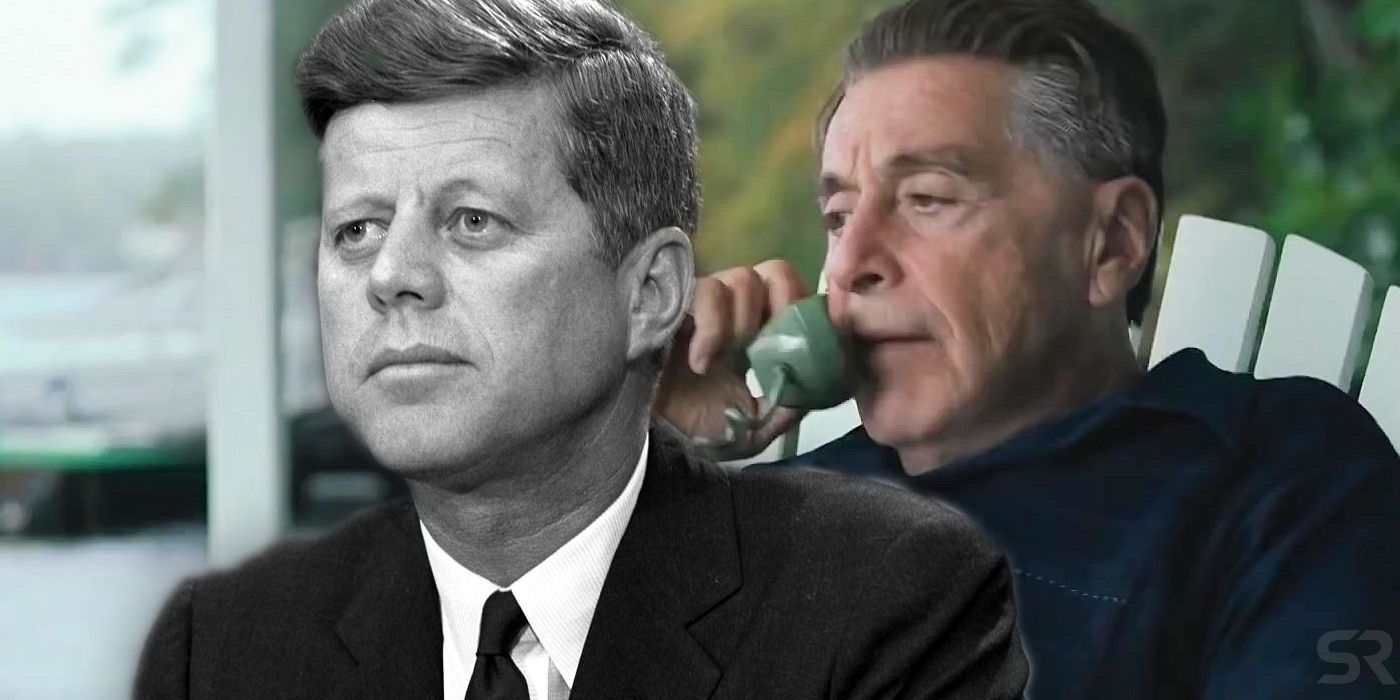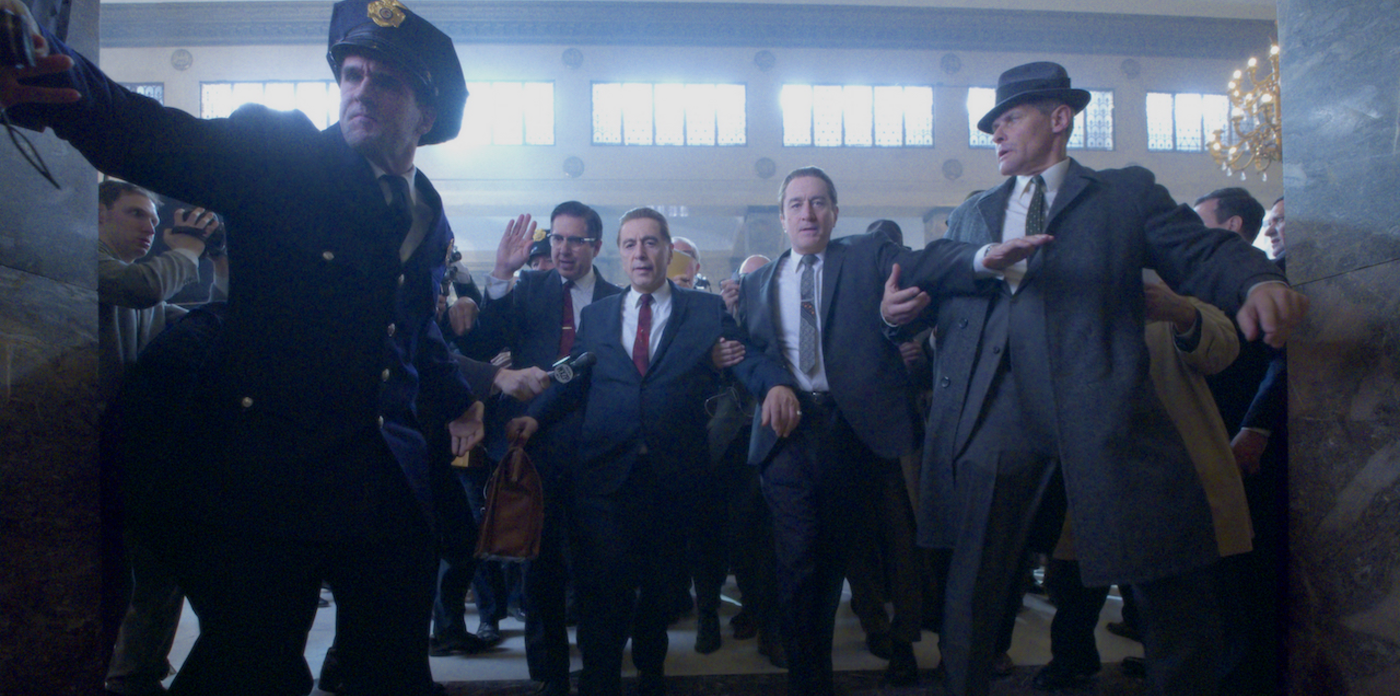Irishman: Was Jimmy Hoffa Really Involved In JFK's Assassination?

The Irishman puts forward the theory that Jimmy Hoffa was responsible for JFK’s assassination, but is there any truth to it? Audiences are drawn to Martin Scorsese's work, as always, but what makes The Irishman especially fascinating is its alleged closeness to the truth. Based on the book I Heard You Paint Houses by former onetime homicide prosecutor and investigator Charles Brandt, the movie tells Frank Sheeran's story from his point-of-view, wherein he tells the tale of his decades-long involvement with the Bufalino crime family as a hitman. On top of that, he claims to have been the man who killed Jimmy Hoffa, the infamous head of the Teamsters union whose disappearance remains one of the most gripping unsolved mysteries of the 20th century.
The Irishman is told from the perspective of an aging Sheeran, played by Robert De Niro, as he narrates his life's adventures directly to the audience. As such, Scorsese firmly places the unfolding narrative as one of unreliability. Sheeran may have done all the things he claimed to, or he may be making it up to compensate for a wasted life. Whatever the case, it's up to the viewer to accept or disregard Sheeran's perspective. One especially striking element of The Irishman is how it shows often ludicrous and deeply disturbing moments with a sheen of the mundane. This world of violence Sheeran lived or fantasized about is far duller and less satisfying than the preferred tale of gangster life. That makes moments such as the scene where it is implied that Hoffa (played by Al Pacino) played a part in the assassination of President John F. Kennedy particularly interesting to dissect.
In The Irishman, Hoffa is shown to be livid over JFK's election in 1960, which the film posits was a success in part because the Bufalino crime family helped to rig some of the voting in the Democratic candidate's favor. Kennedy then named his brother, Robert F. Kennedy, Attorney General, and he famously set up a Senate Select Committee on Improper Activities in Labor and Management. That was famously nicknamed the "Get Hoffa squad" in an effort to bring down the union boss who had been tried but never found guilty of multiple misdemeanors. Eventually, Hoffa was arrested and convicted in 1964 of jury tampering. The film depicts a scene where Sheeran accompanies Hoffa to a diner, where they see news of Kennedy's death on television. Everyone is shocked except for Hoffa. The implication is clear that Hoffa might have had something to do with JFK's assassination, but while there are reasons to believe this conspiracy theory is true, there's no real evidence to suggest Hoffa and the mob had anything to do with it.

In 1963, JFK was assassinated in Texas, fatally shot by by former U.S. Marine Lee Harvey Oswald. Oswald was killed two days later by Dallas nightclub operator Jack Ruby. Ever since, both Kennedy and Oswald's deaths have been mired in an assortment of conspiracy theories. For fans of those interested in conspiracy theories, the JFK assassination is one of those cases that proves endlessly fruitful. Everyone from the CIA and the KGB to then-Vice President Lyndon B. Johnson and Cuban Prime Minister Fidel Castro have all been posited as suspects behind "the real story." Former Los Angeles District Attorney Vincent Bugliosi, the prosecutor behind the Manson family trial, has estimated that around 42 groups, 82 assassins, and 214 people had been accused at one time or another in various conspiracy scenarios relating to JFK.
In his book, Contract on America, David Scheim put forward the theory that Hoffa, along with several Mafia leaders, ordered the assassination of President Kennedy. Frank Ragano, a lawyer who worked frequently with mafia and Teamsters figures like Hoffa, also alleged that Florida mob boss Santo Trafficante, Jr. confessed to him shortly before he died in 1987 that he and Carlos Marcello had arranged the assassination. In I Heard you Paint Houses, Charles Brandt references Ragano's memoir, Mob Lawyer, as leverage for the theory the film posits, writing:
“The consensus reached in the discussion was that if something happened to Bobby, Jack would unleash the dogs. But if something happened to Jack, Vice President Lyndon Johnson would become the president, and it was no secret that Lyndon hated Bobby. Lyndon, it was agreed, definitely would get rid of Bobby as Attorney General."
It’s certainly a compelling argument, and in the grand scheme of JFK conspiracy theories, the idea that the mob put a hit on the President over his administration’s meddling in their affairs is probably one of the more plausible ones out there. Even Robert Blakey, who was chief counsel for the House Select Committee on Assassinations, believed the mob did it. Vincent Bugliosi has written extensively refuting most of the major conspiracies and did the same with Ragano's claim. The truth is that we'll never know what really happened, in large part because most of the people involved with the case and those reportedly associated with it are dead. What The Irishman does is take one of history’s greatest unsolved mysteries and use it as yet another moment of ambiguity in telling a story that dares us to believe it, even when there’s endless evidence to the contrary.
from ScreenRant - Feed https://ift.tt/38oyk0n
No comments